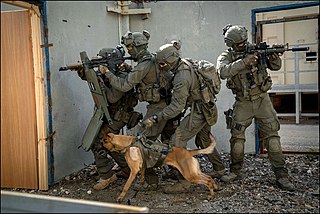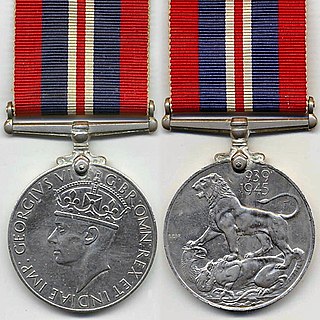
Counterterrorism, also known as anti-terrorism, incorporates the practices, military tactics, techniques, and strategies that governments, law enforcement, business, and intelligence agencies use to combat or eliminate terrorism. Counterterrorism strategies are a government's motivation to use the instruments of national power to defeat terrorists, the organizations they maintain, and the networks they contain.

The Australian Federal Police (AFP) is the national and principal federal law enforcement agency of the Australian Government with the unique role of investigating crime and protecting the national security of the Commonwealth of Australia. The AFP is an independent agency of the Attorney-General's Department and is responsible to the Attorney-General and accountable to the Parliament of Australia. As of October 2019 the Commissioner of the Australian Federal Police is Reece Kershaw, formerly the Northern Territory Police Commissioner.

The Yamam, also called in Hebrew היחידה המיוחדת ללוחמה בטרור and Israel's National Counter Terror Unit (I.N.C.T.U.) in English, is Israel's national counter-terrorism unit, one of four special units of the Israel Border Police. The Yamam is capable of both hostage-rescue operations and offensive take-over raids against terrorist targets in civilian areas. Besides military and counter-terrorism duties, it also performs SWAT duties and undercover police work.

The Global War on Terrorism Service Medal (GWOT-SM) is a military award of the United States Armed Forces which was created through Executive Order 13289 on 12 March 2003, by President George W. Bush. The medal recognizes those military service members who have supported operations to counter terrorism in the War on Terror from 11 September 2001, to a date yet to be determined.

The Western Australia Police Force, colloquially WAPOL, provides police services throughout the state of Western Australia, an area of 2.5 million square kilometres, the world's largest non-federated area of jurisdiction, with a population of 2.66 million, of which 2.11 million reside in the Perth Metropolitan Region.
The Financial Action Task Force (FATF), also known by its French name, Groupe d'action financière (GAFI), is an intergovernmental organisation founded in 1989 on the initiative of the G7 to develop policies to combat money laundering and to maintain certain interest. In 2001, its mandate was expanded to include terrorism financing.

The British South Africa Police (BSAP) was, for most of its existence, the police force of Rhodesia. It was formed as a paramilitary force of mounted infantrymen in 1889 by Cecil Rhodes' British South Africa Company, from which it took its original name, the British South Africa Company's Police. Initially run directly by the company, it began to operate independently in 1896, at which time it also dropped "Company's" from its name. It thereafter served as Rhodesia's regular police force, retaining its name, until 1980, when it was superseded by the Zimbabwe Republic Police, soon after the country's reconstitution into Zimbabwe in April that year.

The Special Task Force (STF) is the elite police tactical unit of the South African Police Service (SAPS). The Special Task Force handles high risk operations that fall beyond the scope of classic policing which require specialised skills.

The South African Police (SAP) was the national police force and law enforcement agency in South Africa from 1913 to 1994; it was the de facto police force in the territory of South West Africa (Namibia) from 1939 to 1981. After South Africa's transition to majority rule in 1994, the SAP was reorganised into the South African Police Service (SAPS).

The War Medal 1939–1945 is a campaign medal which was instituted by the United Kingdom on 16 August 1945, for award to citizens of the British Commonwealth who had served full-time in the Armed Forces or the Merchant Navy for at least 28 days between 3 September 1939 and 2 September 1945.
Terrorism financing is the provision of funds or providing financial support to individual terrorists or non-state actors.
The New York City Police Department's Medal for Valor is the department's third highest medal. It is conferred upon police officers for acts of outstanding personal bravery intelligently performed in the line of duty at imminent personal hazard to life under circumstances evincing a disregard of personal consequences.
Anti-terrorism legislation are laws with the purpose of fighting terrorism. They usually, if not always, follow specific bombings or assassinations. Anti-terrorism legislation usually includes specific amendments allowing the state to bypass its own legislation when fighting terrorism-related crimes, under alleged grounds of necessity.
Terrorism in South Africa has not been seen as a significant threat to the security of the state since the end of apartheid.

The Korea Medal is a military campaign medal which was instituted by the Union of South Africa in 1953. It was awarded to volunteers of the Union Defence Forces for service in Korea during the 1950-1953 Korean War.
The counter-terrorism page primarily deals with special police or military organizations that carry out arrest or direct combat with terrorists. This page deals with the other aspects of counter-terrorism:

Bruce Hoffman is an American political analyst specializing in the study of terrorism and counterterrorism, insurgency and counter-insurgency.

The John Chard Medal is a military long service medal which was instituted by the Union of South Africa on 6 April 1952. Until 1986, it was awarded to members of the Citizen Force of the South African Defence Force for twelve years of efficient service and good conduct. The period of qualifying service was reduced to ten years in 1986.

The Pro Patria Medal is a South African military campaign medal which was instituted by the Republic in 1974. It was awarded to members of the South African Defence Force for service in an operational area, as designated by the Minister of Defence or for engagement in armed combat with the enemy.

The Southern Africa Medal is a military campaign medal which was instituted by the Republic of South Africa in 1987. It was awarded to members of the South African Defence Force for service in military operations in Southern Africa, outside the borders of South Africa and South West Africa, between 1 April 1976 and 21 March 1990.















